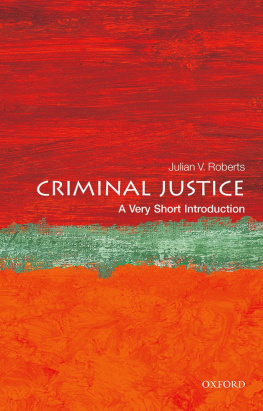
BLACK MALES AND THE CRIMINAL JUSTICE SYSTEM
Relying on a multidisciplinary framework of inquiry and critical perspective, this edited volume addresses the unique experiences of Black males within various stages of contact in the criminal justice system. It provides a comprehensive overview of the administration of justice, the mental and physical health issues faced by Black males, and reintegration into society after system involvement.
Recent eventsincluding but by no means limited to the shootings of unarmed Black men by police in Ferguson, Missouri; Baltimore; Minneapolis; and Chicagohave highlighted the disproportionate likelihood of young Black males to encounter the criminal justice system. Black Males and the Criminal Justice System provides a theoretical and empirical review of the need for an intersectional understanding of Black male experiences and outcomes within the criminal justice system. The intersectional approach, which posits that outcomes of societal experiences are determined by the way the interconnected identities of individuals are perceived and responded to by others, is key to recognizing the various forms of oppression that Black males experience, and the impact these experiences have on them and their families.
This book is intended for students and scholars in criminology, criminal justice, sociology, race/ethnic studies, legal studies, psychology, and African American Studies, and will serve as a reference for researchers who wish to utilize a progressive theoretical approach to study social control, policing, and the criminal justice system.
Jason M. Williams is an Assistant Professor of Justice Studies at Montclair State University. His areas of expertise are race and justice, policing, social control, radical criminology, and the sociology of criminological knowledge. In addition to publishing on the above topics he is currently conducting qualitative research on Black males and reentry, urban youth and policing, and pedagogical-based research around the construction and dissemination of criminological knowledge and its impact on racialized students.
Steven Kniffley is the Associate Director for the Center for Behavioral Health and an Assistant Professor in Spalding Universitys School of Professional Psychology. He currently teaches Multicultural Psychology and Intro to Psychotherapy. Dr. Kniffley is also a Board Certified Clinical Psychologist. Dr. Kniffleys area of expertise is research and clinical work with Black males. Specifically, his work focuses on understanding and developing culturally appropriate interventions for Black male psychopathology as well as barriers to academic success for this population. Dr. Kniffley has written numerous books, book chapters, and articles on Black male mental health, Black males and the criminal justice system, and academic achievement.
By examining the plight of Black males as perennial victims of state violence, this excellent collection of essays serves as a corrective for the often racist and iconic image of the Black male as incorrigible criminal.
Darnell F. Hawkins, PhD, Professor Emeritus, University of Illinois at Chicago
These outstanding editors and brilliant authors of Black Males and the Criminal Justice System provide a definitive and compelling examination of the historical and contemporary challenges for Black males in the most draconian carceral system in the world. Few texts on the intersection of Black males and the criminal justice system illuminate such a comprehensive interdisciplinary sociological, criminological, public health, social work, public policy and social justice approach to analyze structural violence, disproportionate minority contact, collateral consequences, and life outcomes among Black men involved in the criminal justice system. I congratulate and applaud Drs. Williams and Kniffley for their incredibly sophisticated analysis of the most pressing civil and human rights issue for Black males in the 21st century.
Joseph B. Richardson, Jr., PhD, Professor, University of Maryland College Park
First published 2020
by Routledge
52 Vanderbilt Avenue, New York, NY 10017
and by Routledge
2 Park Square, Milton Park, Abingdon, Oxon, OX14 4RN
Routledge is an imprint of the Taylor & Francis Group, an informa business
2020 Taylor & Francis
The right of Jason M. Williams and Steven Kniffley to be identified as the authors of the editorial material, and of the authors for their individual chapters, has been asserted in accordance with sections 77 and 78 of the Copyright, Designs and Patents Act 1988.
All rights reserved. No part of this book may be reprinted or reproduced or utilized in any form or by any electronic, mechanical, or other means, now known or hereafter invented, including photocopying and recording, or in any information storage or retrieval system, without permission in writing from the publishers.
Trademark notice: Product or corporate names may be trademarks or registered trademarks, and are used only for identification and explanation without intent to infringe.
Library of Congress Cataloging-in-Publication Data
Names: Williams, Jason M., 1986- editor. | Kniffley, Steven, Jr., 1985- editor.
Title: Black males and the criminal justice system / [edited by] Jason M. Williams & Steven Kniffley.
Description: Abingdon, Oxon ; New York, NY : Routledge, 2019.
Identifiers: LCCN 2019010328 (print) | LCCN 2019011754 (ebook) | ISBN 9781315522012 (Ebook) | ISBN 9781138697355 (hardback) | ISBN 9781138697362 (pbk.)
Subjects: LCSH: Discrimination in criminal justice administrationUnited States. | African American menSocial conditions. | African American prisoners. | African American criminalsRehabilitation. | United StatesRace relations.
Classification: LCC HV9950 (ebook) | LCC HV9950 .B525 2019 (print) | DDC 364.3/7308996073dc23
LC record available at https://lccn.loc.gov/2019010328
ISBN: 978-1-138-69735-5 (hbk)
ISBN: 978-1-138-69736-2 (pbk)
ISBN: 978-1-315-52201-2 (ebk)
Liza Chowdhury, PhD, is an activist scholar and co-founder of the non-profit organization Reimagining Justice. The organization advocates for creating healing-centered justice responses, justice reinvestment in communities to create safe havens for youth, educational support for the socio-emotional needs of children, and culturally appropriate mental health programs. She has over a decade of experience working in the field of community corrections. Presently, she teaches criminal justice courses as an Assistant Professor at Borough of Manhattan Community College (City University of New York) in the Department of Social Science, Human Services, and Criminal Justice.
Rashanna Butler, BA, is a native of Atlantic City, New Jersey. She attended Fairleigh Dickinson University, Metropolitan Campus, where she graduated with double honors. Rashanna now attends Washington and Lee University School of Law and is currently in her second year. Rashanna hopes to become a criminal defense attorney after law school and serve underrepresented communities.
Darryl Barth, PhD, is an historian of race, Americanization, and colonial violence, with an abiding interest in historical criminology. Currently residing in Brooklyn, New York, he has held teaching positions in the Department of History at the University of New Orleans, and in the Department of American Studies at the University of Sussex in Brighton (UK), as well as the University of Amsterdam and the University of Leiden, in the Netherlands.




